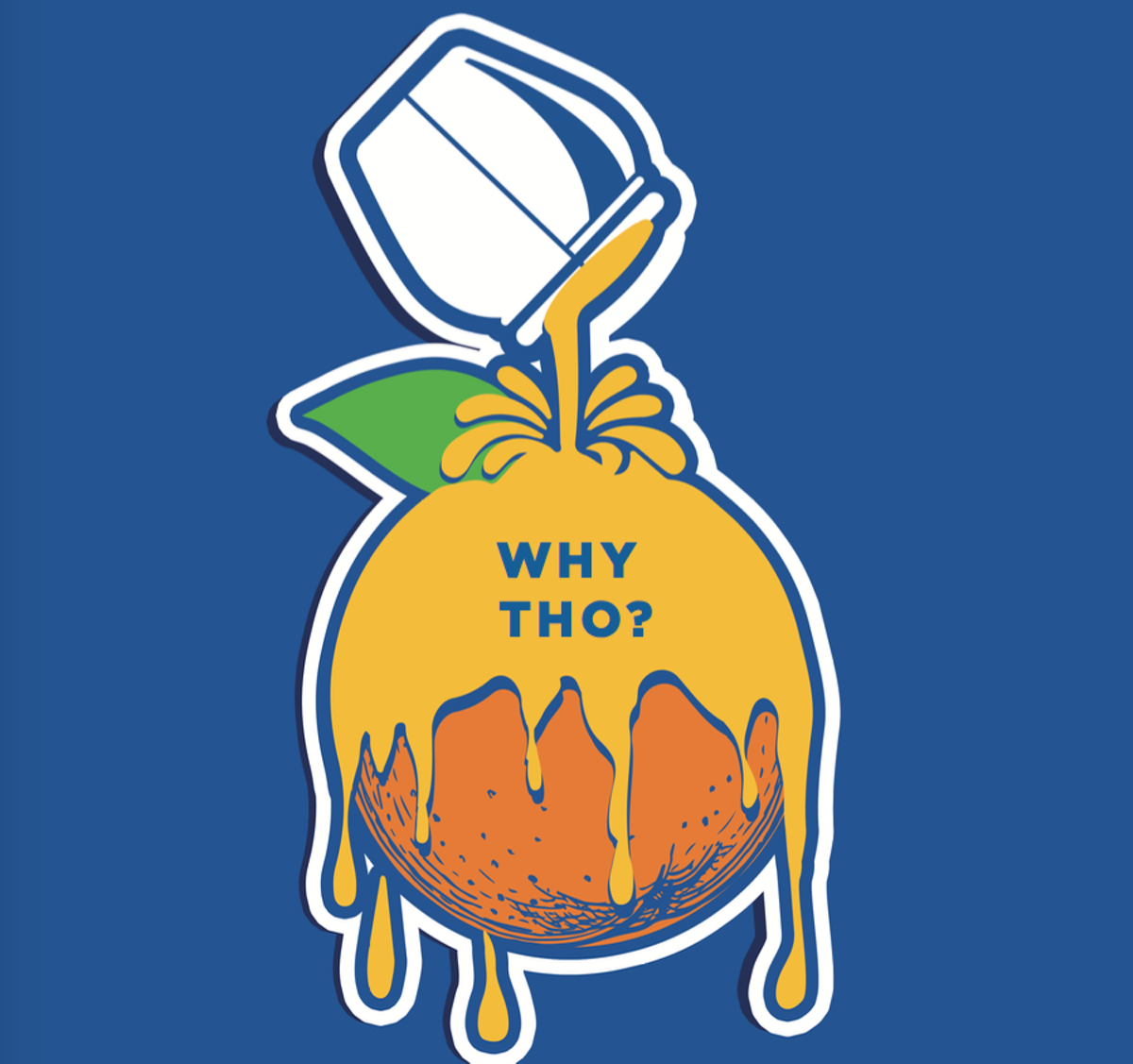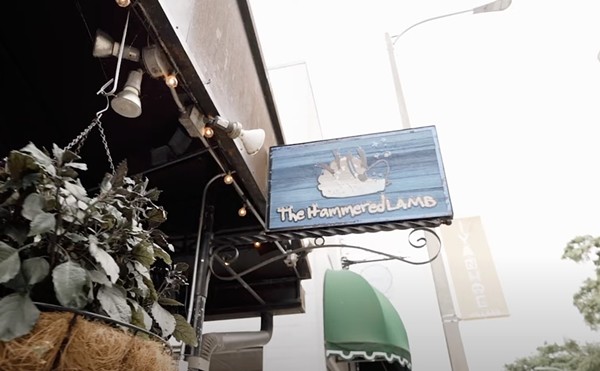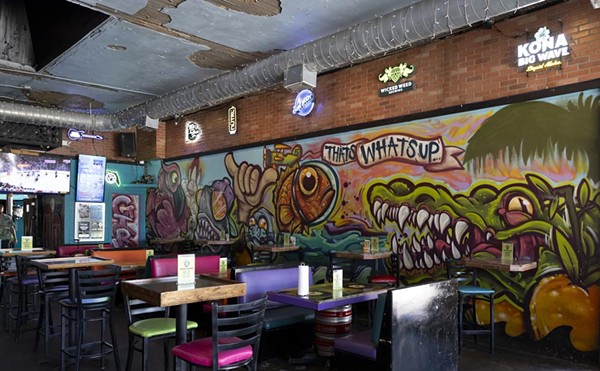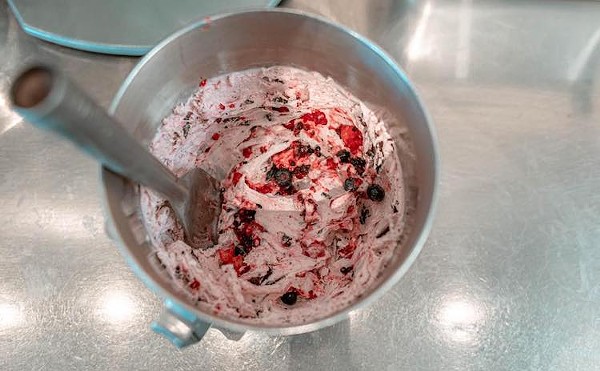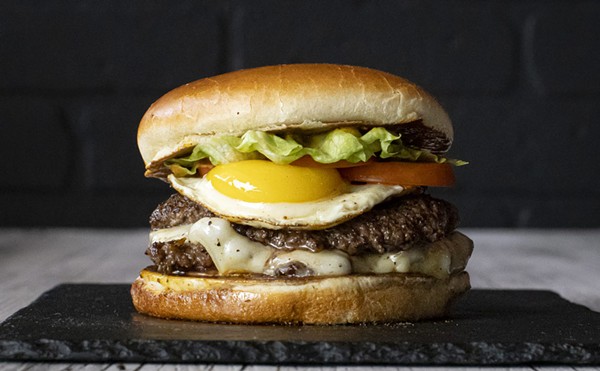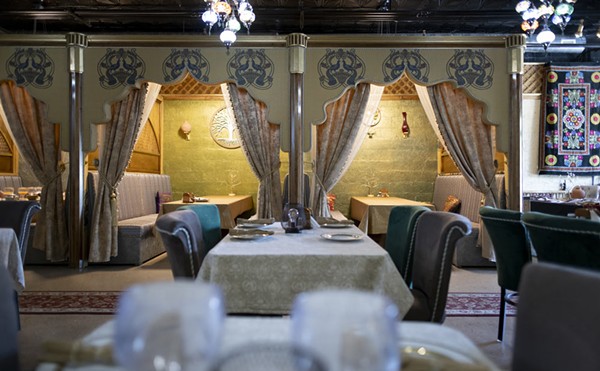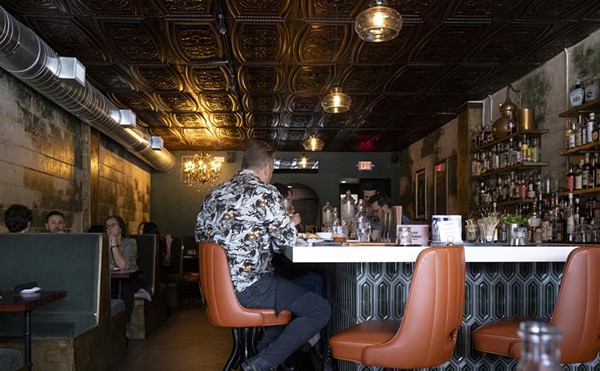Under Orlando's giant observation wheel, Orange County Mayor Teresa Jacobs gathered the region's tourism leaders last April to ask a question with no answer.
"Does Orlando have a signature dish?" Jacobs wondered out loud during her annual State of the County address inside the entertainment complex below the Coca-Cola Orlando Eye. "What are we known for?"
Philadelphia has cheesesteaks. London has fish and chips. Mississippi has a gooey chocolate-based concoction it calls a mud pie. But Orlando? Despite being one of the world's top destinations and home to unrivaled culinary talent, the City Beautiful isn't known for a particular delicacy – our gastronomic delights in the eyes of visitors include gargantuan turkey legs, Dole Whip and butterbeer. So Jacobs proposed a meeting of the minds – the best local chefs in the city's burgeoning restaurant industry would gather with our quasi-public tourism agency, Visit Orlando, to create a signature dish.
"Would y'all agree with me that we can do better than fried turkey legs?" Jacobs asked the crowd. "Would you agree with me that we must do better than fried turkey legs?"
This isn't the first time someone's tried to give Orlando a food to call its own. Back in 1990, Orlando Sentinel columnist Bob Morris held a contest in which his readers submitted 343 boring and bizarre entries into the paper's Florida magazine contest "Find a Food for Orlando." The winner – chosen from among submissions like orange-marinated liver and onions and "Mouseburgers" – was barbecued gator ribs. They never caught on.
After Jacobs' call to action, local foodies proposed a number of native treats: Beefy King's roast beef sandwich, a Cuban bánh mì alongside red beans and rice, and even gator nuggets. But in August, Orange County officials announced the task force of chefs had nominated honey – of all things – as a signature ingredient (a "no-brainer" decision, according to a Visit Orlando social media post), and the competition would be to create a dessert showcasing local honey.
"A signature dish doesn't happen overnight; ultimately it grows organically over time," Jacobs said in a statement after the announcement. "This initiative is a first step in starting the conversation as to what dish the community thinks represents Orlando. In the process, we continue to expand people's awareness of the rich and unique culinary offerings found throughout our region."
Even as the competition came to an end with the Dec. 7 announcement of a winner from among the 10 finalists who created nectar-inspired takes on pastries, cakes and even gelato, some still wonder how we got to honey in the first place, when our county, major streets, landmarks, parades and symbols all namecheck citrus.
A behind-the-scenes look at the process reveals a thriving local backyard beekeeping scene that includes our mayor, and the struggle to get the rest of the world to recognize Orlando's rising culinary profile.
Florida's alligators had only been off the endangered species list for three years when journalist Bob Morris suggested Orlandoans eat them as our quintessential dish.
After being close to extinction thanks to hunters who wanted their hides, the hulking reptiles were placed under federal protection in 1967. Twenty years of not being hunted helped the American alligator recover its population; it was taken off the endangered list in 1987, and Floridians went right back to hunting them, eventually hatching a farming industry currently worth millions.
"Right around the time of the contest, they were legalizing gator trapping," Morris remembers. "When I was growing up, it was against the law to kill one. It was a big deal around here – gator meat was coming out on the market. Everyone was kind of thinking it was going to catch on in a big way."
It was Palmer Yergey of the since-closed Palmer's Place in Winter Park who convinced Morris' panel to go for his intensely marinated gator ribs with a variety of flavor options that included teriyaki sauce.
"I thought it was badass," Morris says. "It tasted pretty good, too. It never caught on, for God's sake, because, you know, if you want ribs, you want to eat pork ribs, not gator ribs. It's pricey, which is why you'll never see them on menus. You got to want them, too, because you got to kill the goddamn gator first."
In a somewhat similar, albeit less toothy way, Florida's honeybees and their golden product have experienced a comparable renaissance.
In 1987, state agriculture inspectors found the bee-killing varroa mites in a Winter Garden hive, according to Sentinel archives. The mites decimated bee colonies across the state, and by 2006, the number of registered beekeepers dropped to about 670, says David Westervelt, chief apiary inspector at the Florida Department of Agriculture and Consumer Services. Things turned around quickly after a growing public concern over the welfare of the tiny pollinators and a change in state regulations in 2012 that voided local municipal restrictions on beekeeping, making it easier to set up hives in residential backyards.
As of last week, 4,665 beekeepers were registered in Florida. Out of that number, Westervelt says about 4,000 are backyard beekeepers, meaning they own anywhere from one to 40 hives, while the rest are sideliner beekeepers and commercial beekeepers, who can own hundreds of hives.
Westervelt says Central Florida is an ideal location for beekeeping: It's warm and sunny for the majority of the year, and its location in the middle of the state makes it easy for commercial beekeepers to ship their colonies to other states to pollinate crops, such as almonds in California.
Perhaps all this information is what local officials were thinking when they set up this year's first meeting on record to discuss Orlando's signature dish on Feb. 16, months before the project was made public. John Rife, owner of East End Market and a backyard apiary enthusiast, says he was invited along with Visit Orlando officials, Mayor Teresa Jacobs, marketing executives, professional culinarians from Disney and chefs from high-end restaurants in Orlando like Le Coq au Vin and Chez Vincent.
"They wanted me to talk about the backyard beekeeping scene," Rife says. "I think at that point, they have already been close to thinking about honey or the mayor would not have brought her honey to the meeting. I brought honey, too, but I didn't want to try to trump the mayor. She gave out vials of honey in her presentation with the glass embossed with bees – it was a great package."
Jacobs reached out to Visit Orlando officials at the beginning of 2017 with the idea of a signature dish, says Denise Spiegel, spokesperson for the organization. Many items were discussed during several meetings, including the possibility of honey as a key ingredient.
"While honey became a clear frontrunner in the February meeting, there were many other pieces to develop in order to announce both the key ingredient and the process for the competition in August," Spiegel says in an email. "There were many options discussed, including citrus. The group liked how honey provided a strong tie back to Orange County's citrus roots but also showcased the diversity of the agriculture in Orlando and a growing local industry."
Visit Orlando, which has been under fire from state officials for a lack of transparency in how it spent the $51 million it received last year from county hotel taxes, did not respond to questions about how much taxpayer money it has spent on this initiative. Previously, Visit Orlando has argued against releasing contract details because it would violate confidentiality agreements. Orange County spokesperson Doreen Overstreet says the county "has not spent any funds on this effort, nor are there any plans to spend money on this initiative in the future."
Jacobs and her husband, Bruce Jacobs, have owned backyard hives for at least the past three years and have recently started packaging it under the label "The Mayor's Honey." On the Facebook page "Teresa Jacobs for Orange County Mayor," Jacobs says they don't get enough honey from three hives to sell and mostly give it away as gifts. Two signature-dish finalists also said Jacobs gifted them with samples of her honey at a second event.
"My husband Bruce is my honey, and the honey in this bottle comes from our two backyard hives," Jacobs writes in an aside on her honey's label. "We started beekeeping a few years ago, and it's been an amazing experience learning about bees and how vital they are to our environment. Enjoy this raw unfiltered honey – from my honey to yours."
Overstreet says that any inferences that Jacobs would financially gain from the initiative are "categorically false. ... It is quite simply a hobby that she and her husband enjoy."
Ryan Schelling, the executive sous chef at the Four Seasons resort in Orlando, says everyone's first thought at the meeting was an obvious choice – citrus.
Florida has many iconic symbols associated with the state (both Florida Man and the mythical skunk ape come to mind), but none is more ubiquitous than the orange. There's an orange on our license plates, our state beverage is orange juice and our state flower is the orange blossom. Enduring through years of devastating freezes and hurricanes over the past three centuries, Florida's citrus production of oranges, grapefruits, tangerines and tangelos reached its peak in 1998, selling 244 million boxes of oranges. In recent decades, citrus greening disease has plagued crops across the state, decimating a $10 billion industry, which produced less than 69 million boxes of oranges during the 2016–2017 season.
Once a hub for the fruit, citrus production in Central Florida has also declined as rural areas have been developed. While Polk County remains among the state's top areas for oranges, producing about 12.5 million boxes, Orange County's crop is one of the smallest – 351,000 boxes in the 2015-2016 season, according to statistics from the Florida Department of Agriculture and Consumer Services. Still, citrus symbols maintain a strong presence in Orange County. We were christened as a county when the fruit was still our main product, Orlando's two main strips are named after oranges, every year we have a citrus parade and, until last year, Camping World Stadium was still called the Citrus Bowl.
At some point, though, Schelling and Rife say the conversation on Orlando's signature dish drifted away from citrus and other possibilities like Zellwood sweet corn and local honey.
"Based on the citrus greening, we kind of moved away from it," Rife says. "It's also such a distinct taste that it's maybe not broad enough that anyone could play in the sandbox. ... The reason we chose to showcase a dessert is we wanted to play on the fact that it's such a family-oriented destination. We wanted a sense of whimsy, fun and indulgence."
When Visit Orlando and Orange County officials finally announced the decision to choose local honey as Orlando's signature ingredient, they touted Florida's variety of the product – including gallberry, saw palmetto, tupelo, blueberry, Brazilian pepper and the popular orange blossom honey.
"Florida has the largest variety of honey of any state," says Beth Fox, spokesperson for the Orange Blossom Beekeepers Association. "You have a lot of diverse nectar sources and more wildflowers, so you get all different colors and flavors."
Fox says orange blossom honey and tupelo honey are Florida's most coveted exports, though she's particular to a dark-colored variety she calls "Miami honey," a tropical product that includes avocado, mango, mamey, papaya and lychee plants as nectar sources.
To make orange blossom honey, beekeepers fix agreements with citrus growers to keep their bees near groves. Despite the commonly held belief that these two hold a symbiotic relationship, Fox says what started off as a cooperative agreement has declined because most citrus varieties are self-pollinating. Some growers don't want bees in their groves because insect pollination increases the amount of seeds in the fruit, though many still coordinate pollination services with beekeepers. Ironically, the greening disease that has ravaged Florida's citrus trees and the pesticides used to stop it has had a secondary impact on the creation of orange blossom honey. In 2013, the state fined one citrus grower $1,500 after the owner illegally sprayed pesticides that caused the death of millions of bees.
The U.S. Department of Agriculture ranked Florida fifth in its annual report on honey production for 2016, below North Dakota, South Dakota, Montana and California, at roughly 10.8 million pounds of honey produced. Fox says honey is a "very Central Florida thing" because so many beekeepers are registered in the area. A September beekeepers registration count from the state department of agriculture lists Orange County as having 118 beekeepers, but other Florida counties like Hillsborough and Pinellas topped Orange with 236 and 185 beekeepers, respectively.
"I think this contest is nothing but positive," Fox says. "I loved the fact that the mayor came up with this idea, and they didn't say honey was just the signature food. You can put it on everything – toast, coffee, tea. I make my own salad dressings with at least a teaspoon of honey. I eat it every day."
Fox says it's difficult to truly know exactly where grocery store honey is coming from, so the best option is to buy honey from a beekeeper you know, like someone selling their product at a farmers market.
With the announcement of its signature ingredient, Visit Orlando also introduced a culinary competition open to all Orlando restaurant chefs to make a dessert using local honey as a key ingredient. The public would vote online to narrow it down to 10 entries, from which judges would later choose a winner. Those 10 finalists reveal something singular about this city: It's overflowing with culinary prowess.
Using honey as their signature ingredient, chefs crafted mouthwatering desserts that look enchanting. There's the deliciously complex dish by Chef Gloriann Rivera of 1921 by Norman Van Aken that combines honey crémeux with spiced cake topped with honey sponge candy, pistachio crumble, candied persimmon and chocolate black tea sorbet. On the opposite end, there's a rich simplicity from executive pastry Chef Rabii Saber of Four Seasons Resort Orlando, with his peanut butter-swirled gelato that's lightly scented with orange blossom honey and topped with crunchy candied peanuts. Saber, who was on the 2017 American team for the prestigious Coupe du Monde de la Pâtisserie competition in France, says local officials gave no guidelines for how simple or complex the dish should be. So Saber tried to create something he thought would be easy for mom-and-pop businesses and smaller ventures to replicate.
"Orlando is known for its attractions and Florida weather is always warm, so what's better than ice cream or gelato?" Saber says. "For the Coupe du Monde competition, we had to dig deep into the recipe. We worked months to make the best chocolate cake in the world. We had to get the perfect measure of density of sugar in each component, so it's a lot of science. But for this competition, I didn't want to make it so complicated you couldn't duplicate it. I wanted to contribute to my community more wisely."
According to several interviews with local chefs, Visit Orlando officials didn't give competitors many guidelines on how the winning recipe would be used. Would it be used in promotional materials? Would they ask every restaurant in Orlando to have their own version of the dessert?
When OW asked, Orange County officials said Visit Orlando was responsible for every aspect of the competition. Visit Orlando spokesperson Spiegel said the agency would be "promoting the dish and looking at ways it may be adopted, including a possible integration into Visit Orlando's Magical Dining Month," with more details to come. In a previous statement, Visit Orlando president and CEO George Aguel said the initiative "celebrates the culinary talent in our region, unites the community through a friendly competition, and allows us to create some great 'buzz' about Orlando's dining scene and chef artistry."
Chef Trina Gregory-Propst, owner of Se7enbites, made it to the final 10 competitors with her creation, a three-layered honey velvet cake brushed with orange blossom honey syrup, filled with orange blossom honey pastry cream and topped with buttercream and crushed roasted salted pistachios. The only requirement she received was to use local honey, though she tried to make something that would be easy to share.
"Everybody's baking skill is different," she says. "In my mind, when I think of a signature dish, I would have to say I think it would be accessible to the public. A Key lime pie – that's pretty accessible. Someone who comes to Orlando to taste this dessert should be able to re-create it at home."
Gregory-Propst says she appreciated that Visit Orlando officials dove a little deeper, past theme park foods and into something that really speaks to Orlando. Rife, owner of East End Market, agrees.
"All of us at the table wanted to celebrate the culinary scene in Orlando," he says. "It's such a diverse place, and this signature ingredient authentic to Central Florida plays to the heart of who we are."
That said, it's hard to predict how much of this will catch on with local consumers or tourists.
"I think the notion of a signature dish has to grow organically," Morris says. "It's part of the cultural identity – you can't just force it upon us and say this is our dish. The Philly cheesesteak, for example, is street food, and we don't have so much street food here. I love the Asian food here, and Orlando has great Spanish and Puerto Rican food as well. There are so many great eating places here in the city because of the diversity. I think whatever it is they come up with, as well-intentioned as it might be, it's going to seem contrived."

